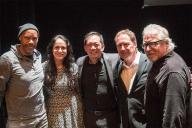It was a wild and wooly Monday evening of live chamber music and documentary film.
Jacaranda Music, a respected Los Angeles contemporary-classical music series, joined forces with the ABC Television Network on June 13 at the Kirk Douglas Theatre in Culver City to fete composer Mark Isham’s creative contribution to American Crime, the network’s two-year-running anthology crime series.
Keen reception from an avid audience of television people mixed with fine-arts folk gave the evening its special oomph. The cornerstone of the rich performance-event was the world premiere of American Crime Suite, Isham’s three-sectioned composition for chamber orchestra based on his signature themes for the television series.
Works by Steve Reich, Arvo Pärt, and Max Richter—weighty composers whose distinctive minimalist music inspired Isham and series creator John Ridley in forging Crime’s sound universe—also populated the program.
Ridley, in attendance, expressed surprise and delight that a television series could spawn a live arts experience of such high caliber. He offered remarks in an incandescent Q&A with Isham (who had performed on synthesizer in his own compositions) and Jacaranda’s director, Patrick Scott, following the concert.
“This is pretty spectacular,” Ridley said at the outset with obvious pleasure. “I’ve been in L.A. for 26 years. If someone had told me, when I was broke and living on Hollywood Boulevard, I would be part of this distinguished evening … This is one of the most special evenings I’ve ever been involved with professionally.”
The spark for Ridley’s creative connection with Isham came from shared admiration for a piece of music. “Mark played me the Max Richter theme [to illustrate] my show about social turmoil in America,” said Ridley. Richter’s November (2002), a surging work for strings, was given a full-blooded reading by the 15-player Jacaranda Chamber Orchestra with violinist Alyssa Park as soloist. Isham modeled this music for American Crime’s dark rumbling theme.
Isham’s 40-plus-year track record across genres spans his childhood roots in classical music to his rock contributions as a session man for the Rolling Stones, Bruce Springsteen, Joni Mitchell and Van Morrison, to jazz and electronic music.
“I came from a classical household; as a kid I hated pop music,” said the man whom ASCAP has honored with the Henry Mancini Award for Lifetime Achievement.
“I have a wild background in many genres. I started with trumpet, playing at the San Francisco Orchestra under Seiji Ozawa. Life changed when I encountered Morton Subotnick at Berkeley. Then I heard Miles Davis and that really screwed me up,” he said with a laugh. “I’m really interested in bizarre electronic music. All of this got fused into a film-composer style.”
Ridley aptly noted, “This is a unique, creative guy.”
Speaking in a documentary, Inside American Crime, screened at the start of the evening, Isham called Ridley, “a great communicator and a consummate artist. He is my right hand man.”
Ridley responded in kind: “[The music] takes us to a place we haven’t been in the show, Mark’s that guy. Mark created a piece of music that is extraordinary. We leaned on it a lot. It relates to what the series is about.”
Ridley also expressed deep appreciation to ABC, “for providing an orchestra every week” an act of faith that makes it abundantly clear that “they support music."
“In television, we think primarily in terms of [script] writing and performance by actors. We also believe there is an opportunity to develop other arts,” he said.
A prime example is the recent rare showcasing of dance in American Crime’s Season 2: Episode 5. A ballet derived from the series theme of sexual abuse of youngsters, Touch, set to Isham’s original music, was performed on network broadcast by the Houston-based NobleMotion Dance. Isham’s lilting score for Touch, its pattering lightness tinged by dissonance, got fleet reading under the baton of Jacaranda conductor Mark Alan Hilt.
Also opening the program, a palate cleanser, was Steve Reich’s Nagoya Marimbas, performed by Yuri Inoo and Nick Stroup without a score and Fratres, a wrenching adagio work by Arvo Pärt. Featured throughout the evening was The Lyris Quartet, whose cellist, Timothy Loo, was instrumental in producing the event.
The post-performance chatter ran so hot and heavy that the management of Culver City’s Kirk Douglas Theatre had to flash lobby lights to send its audience home. It all boded well for further melding of the television and arts communities in a way that Los Angeles uniquely appears to be embracing.
For a taste of this remarkable performance, click HERE for an exclusive video!

















